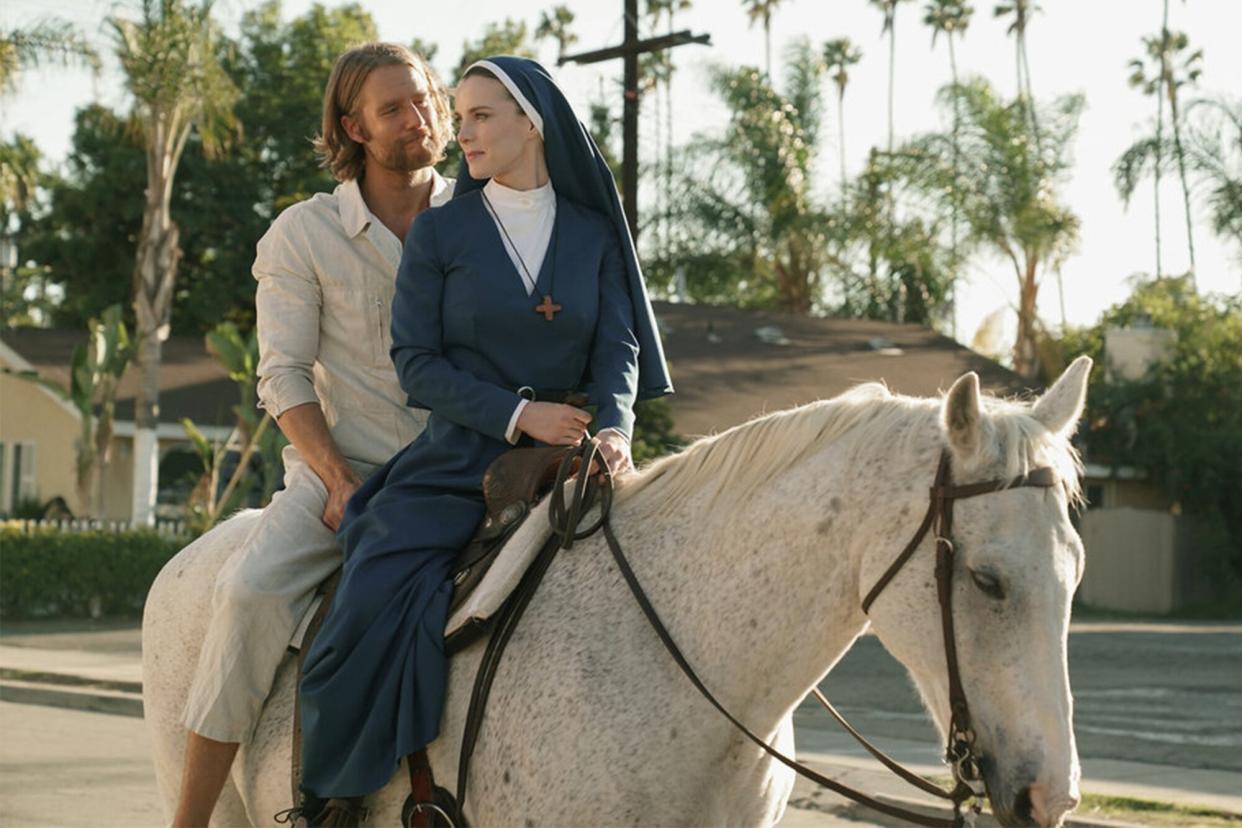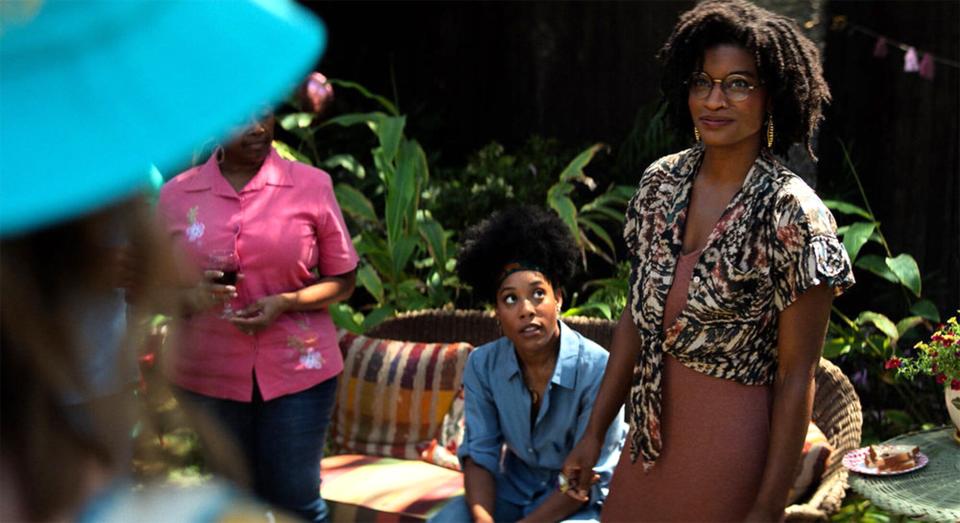Mrs. Davis director talks the AI's unexpected origin story revealed in finale

WARNING: This article contains spoilers for the Mrs. Davis finale.
How do you visualize artificial intelligence? That was one of the central artistic challenges facing the team behind Mrs. Davis. Owen Harris — who directed four episodes of the Peacock series, including the premiere and finale — tells EW that the look of the show was designed to minimize artificiality.
"Even though we do have big setpieces where we use lots of VFX and CG and all that sort of stuff, I really wanted to bring an earthiness and a grittiness to the visuals, give it a Coen brothers quality," Harris tells EW. "That makes it easier to set up this conflict between the human characters and this technology, which is now being introduced into our world. The characters are struggling with the same question that we are, which is: Where does this technology fit into our lives?"
Harris continues, "for me, it was really important that we stripped back that artificial quality from the story itself. That became a real challenge for the VFX: It had to fit seamlessly into this world without jarring the eye or breaking the Uncanny Valley, so that our feet were solidly in the more grounded, real world that Simone inhabits."

Elizabeth Morris/PEACOCK Jake McDorman and Betty Gilpin on 'Mrs. Davis'
The show's portrayal of AI was also helped by a clever concept from Mrs. Davis co-creators Damon Lindelof and Tara Hernandez. Any time that the titular algorithm communicates with a human character like Simone (Betty Gilpin), it speaks through a human host. Many humans in the world of the show have gratefully accepted the AI as their overlord, and walk around with earbuds through which Mrs. Davis tells them what to say.
In the finale, this technique takes on a powerful resonance when Simone briefly becomes the algorithm's mouthpiece in a conversation with her mother, Celeste (Elizabeth Marvel). The conversation works on its own — there are certain things that Celeste needs to hear directly from the AI — but has other emotions underneath the surface thanks to the contentious nature of this mother-daughter relationship. Finally, with the AI as a medium, these two are able to communicate.
"I think it was a really clever bit of storytelling to give the AI a human voice," Harris says. "Too often, these sorts of tales about AI can feel quite cold and distant. Making Mrs. Davis human in this way disarms you — but at the same time, it's eerie."
Harris adds, "Simone in that scene is playing it straight. She's been given a job to do, which is to communicate for Mrs. Davis. While doing that, the meaning of what she's saying creeps up on her. Simone shows great empathy to her mom, and what I took out of that scene in particular was this powerful moment where someone whose child has constantly been looking for acts of kindness is then struck by her own daughter's kindness. She starts to understand just who her daughter has become without her."
When Gilpin spoke with EW ahead of the series' premiere, she had nothing but great things to say about working with Marvel as her mother.
"Her character was the engineer behind the magic tricks performed by Simone/Lizzie's dad," Gilpin told EW. "It's like having the ultimate cynic as your mom. When you've been raised by someone who has an answer for everything, believing in God would be the silliest thing you could possibly do, and then Lizzie goes down a life of belief. I think that maybe Simone rejects Mrs. Davis as a mother with all the answers because she's already done that with her own mother."

Peacock Jonica Booth and Ashley Romans on 'Mrs. Davis.'
Simone is looking for a lot of things in this show: The Holy Grail, for one, but also a way to destroy the AI. How can you defeat an adversary without knowing where they come from? In the Mrs. Davis finale, Simone (and viewers) finally learn the surprising origin of Mrs. Davis. It turns out that this world-conquering algorithm was originally invented by a seemingly normal woman named Joy (Ashley Romans), and first released into the world as part of Buffalo Wild Wings customer service.
"They had [the Buffalo Wild Wings reveal] in their heads literally from the first moment I spoke to them," Harris says of Lindelof and Hernandez. "It's very much at the heart of what we're trying to say about technology. At the moment, we are very willing to invest a lot of our futures, our decisions, our hopes and fears into this. A lot of drama tends to dramatize AI as sinister, but Mrs. Davis portrays it in a different way: It can be what we want it to be, but we've gotta be careful because it's not always what we think it's gonna be. It's our job to make sure that the technology we create is of benefit to us."
Harris continues, "what you find out in Mrs. Davis is that this piece of technology was actually created for something completely different, but through our own hubris and arrogance, it ended up basically running the world. That's just a very good reflection of where we are. A social media platform that was built for one thing can end up taking on a very dramatically different thing, like shaping world politics. We thought it was a fun and smart way of reshaping our perspective on technology and our relationship with it."
All eight episodes of Mrs. Davis are streaming now on Peacock.
Sign up for Entertainment Weekly's free daily newsletter to get breaking TV news, exclusive first looks, recaps, reviews, interviews with your favorite stars, and more.
Related content:

 Yahoo News
Yahoo News 
